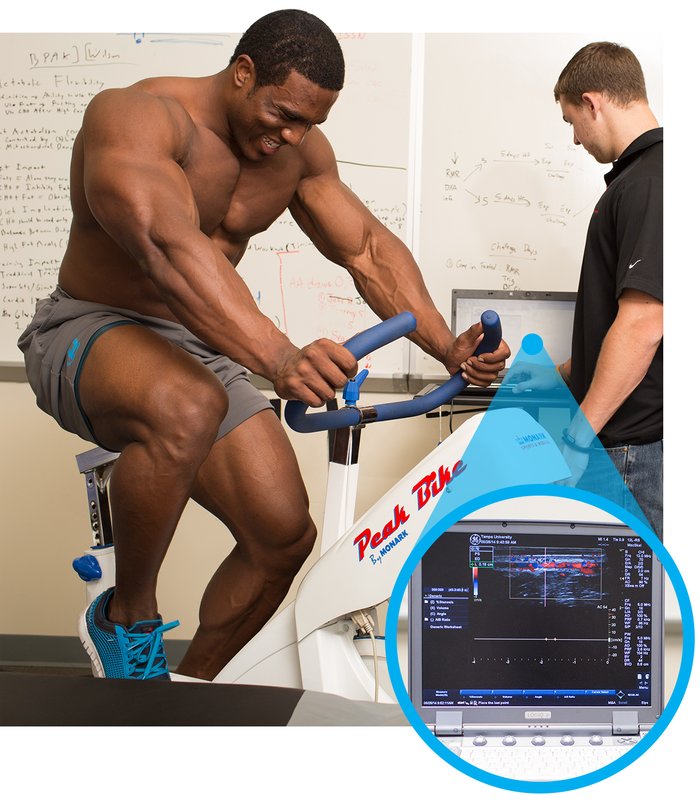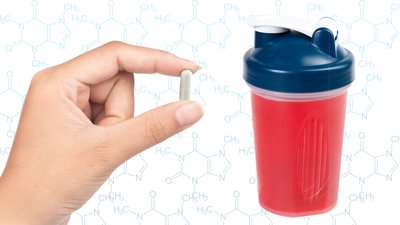These days, strength training and caffeine go together like The Rock and Kevin Hart. But, just like "Jumanji" doesn't do it for everybody, guzzling a pre-workout with 300 milligrams of caffeine in it might not turn you into the superhuman lifter you dream of being. In fact, depending on your genetic makeup, it might be sucking the air out of your session and leaving you whimpering in the corner.
New research from Canada took a very close look at the way the human body metabolizes caffeine.[1] Nutritionists, statisticians, and kinesiologists from the University of Toronto recruited 101 male athletes around the age of 25. The group included cyclists, marathon runners, rowers, cross-country skiers, boxers, baseball players, and powerlifters.

Using saliva samples, the researchers were able to determine the rate at which each athlete's body metabolized caffeine. Here's how: Our bodies contain a gene called CYP1A2. Changes in the DNA sequence of the gene can make CYP1A2 more or less efficient at metabolizing caffeine. Based on those results, they divided the group into fast metabolizers and slow metabolizers and showed that caffeine-fueled performances are either in your genes, or not.
Let the testing begin!
Once a week for three weeks, the athletes reported to a testing center where they swallowed a capsule that contained either caffeine or a placebo. The athletes rested for 25 minutes, did a few minutes of warm-up exercises, and then performed a predetermined combination of vertical jumps and handgrip tests, a Wingate test to measure peak anaerobic power, and a 10-kilometer cycling time trial.

At the end of the four weeks, the researchers compared exercise test results to the CYP1A2 results and found that caffeine helped 49 of the 101 athletes (the fast metabolizers) improve their performance by 6.8 percent. Another 44 of the athletes (slow metabolizers) saw no performance change at all, while 8 of the slow metabolizers saw their performance decrease by as much as 14 percent—all because of how their CYP1A2 genes dealt with the caffeine.
Does caffeine work for you? Are you sure?
If you pay attention to your body, you may already be able to tell whether a pre-workout that contains caffeine helps or harms your performance. And, if you're a slow metabolizer, then beating your head against the wall and continually caffeinating probably won't solve the issue. It'll just leave you with poor-quality sleep and stressed adrenal glands. If that sounds familiar, hey, there are still plenty of stimulant-free pre-workouts containing proven performance boosters that could help you get the few more reps that caffeine couldn't.
If you can't tell if caffeine is working or not, well, you're not alone. When asked at the end of the four weeks whether the pills they had been given contained caffeine, only 3 out of 101 athletes got it right and said they have been given two doses of caffeine and one placebo. More than 80 percent of the athletes said they didn't think they'd been given any caffeine.

If you're not sure whether your genes make you the best or worst person to load up on caffeine before a workout, you can get a gene test for about $200 that'll let you know for sure. Or, just keep taking pre-workout for all the other ingredients, but don't expect magic—after all, stringing together dozens of quality workouts in a row is far more important than what happens in any single one of them.
Even if you're pretty sure you're a fast metabolizer, remember that caffeine doesn't peak in the bloodstream for 30-45 minutes after you take it. So, taking it as you walk onto the gym floor probably won't help you do much for your first few exercises of the day, or maybe your entire workout.
And, if the latest version of "Jumanji" doesn't do it for you, get retro and check out the 1995 version with Robin Williams and Kirsten Dunst. There's no genetic test for humor, but you'll know it when you see it.
References
- Guest, N., Corey, P., Vescovi, J., & El-Sohemy, A. (2018). Caffeine, CYP1A2 Genotype, and Endurance Performance in Athletes. Medicine and Science in Sports and Exercise.

